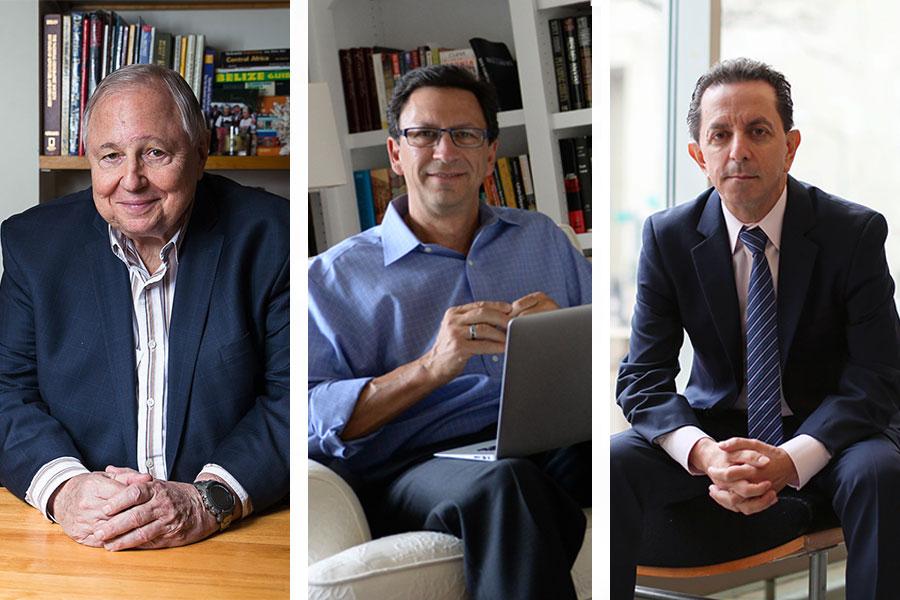Since President Donald Trump stepped into office two years ago, professor John Banzhaf’s phone has barely stopped ringing.
Sometimes, the calls are from Reuters reporters asking for his expertise on Trump’s border separation policy. Other times, TIME reporters want to know the implications of Trump’s comments about gun rights and due process.
Banzhaf, a professor of public interest law, said he is contacted several times a week and sometimes two or three times a day by news organizations. He said he tries not to take positions on Trump’s policies but often provides an impartial analysis to help readers understand the implications of the president’s actions.
“When the media contacts me, they mostly ask about Trump and all of his various manifestations,” Banzhaf said. “He does things which are unprecedented, which are controversial and which challenges people’s assumptions of things they’re used to.”
More than two years after Trump took office, the president’s actions make up the bulk of conversations for many people in the District – including GW faculty. In interviews, more than 10 professors said journalists have turned to them for their expertise on international affairs, politics, science and more – mostly because of their close proximity to one of the most unprecedented administrations in the history of the country.
Richard Pierce, a professor of law, said journalists have more often asked for his expertise because the Trump administration “skirts along the edges of the law” more frequently than past presidents. He said reporters may be more interested in GW professors in the Trump era because of the “disproportionate number” of faculty who are recognized in the fields of politics and law.
Pierce has been quoted in articles recently discussing the legal considerations behind a possible Trump call to fire Special Counsel Robert Mueller, who is investigating Russia’s interference in the 2016 presidential election. Pierce has spoken with and written for well-known publications like Bloomberg Law and The Hill about Mueller and other White House decisions.
“The press and academic institutions are, understandably, very interested in trying to figure out which things Trump is doing are legal and which are not,” Pierce said.
James Lebovic, a professor of political science and international affairs, said he receives several media requests per month from both domestic and international reporters who assume his proximity to the White House and the U.S. Capitol give him better insight into the Trump administration. He said he spends a couple of hours on the phone each week with journalists.
But he said walking through detailed analysis of presidential pets and diplomacy in Buenos Aires is worth the time on the phone because his expertise has been used in a way that serves the public good.
Lebovic said that 10 years ago, he would happily pass up opportunities for interviews because he did not know how to speak with journalists. But now he said he understands the power of academics to provide facts and context in complicated political narratives.
“I think the Trump administration is a national tragedy, an assault on everything this country has stood for,” he said. “It’s frankly important for people who have something to offer to take a stand.”
Frank Sesno, the director of the School of Media and Public Affairs, said that because the public increasingly distrusts the media and Trump has characterized journalists as the “enemy of the people,” he has often been quoted in stories defending the need for a free press. Sesno said he often rebuts Trump’s criticisms of the media by offering expertise on anonymous sources and correction processes.
Sesno was quoted in The New York Times earlier this month offering context about CNN’s decision to hire a former Trump staffer.
“I hope I’m adding some value on how journalism does its job in an era when it’s under siege and under attack and often doubted simply because it’s under attack,” he said.
Dave Karpf, the associate director of SMPA, said media organizations like The Washington Post and The New York Times often contact him about Trump’s behavior on social media – one of his research specialties. Trump has been more active on social media than past presidents, making Karpf’s expertise on virtual political advocacy and movements more relevant, he said.
“While there’s always something new to report on in past administrations, we are especially not in normal times right now and that leads to more public attention and media coverage on politics, in particular politics with a technological or communication background,” Karpf said.
Karpf was quoted in the Washington Examiner earlier this month and Wired late last year about the way Trump used social media to win the election.
Roberto Izurieta, the director of Latin American projects for the Graduate School of Political Management, said that since Trump became president, he has accepted double the number of interviews for CNN en Español and most often discusses the economy and immigration.
Since the start of the year, Izurieta has been featured in publications like Univision discussing Trump’s border wall. He also regularly contributes articles to CNN en Español and wrote a piece last month criticizing Trump’s assertion that criminals come to the United States from Mexico.
“We have to be part of the debate, we have to be relevant, we have to be visible,” Izurieta said. “A great deal of the interest and benefits of the students who choose GW in a great deal because of where we are and what we are.”
Shannon Mallard contributed reporting.





